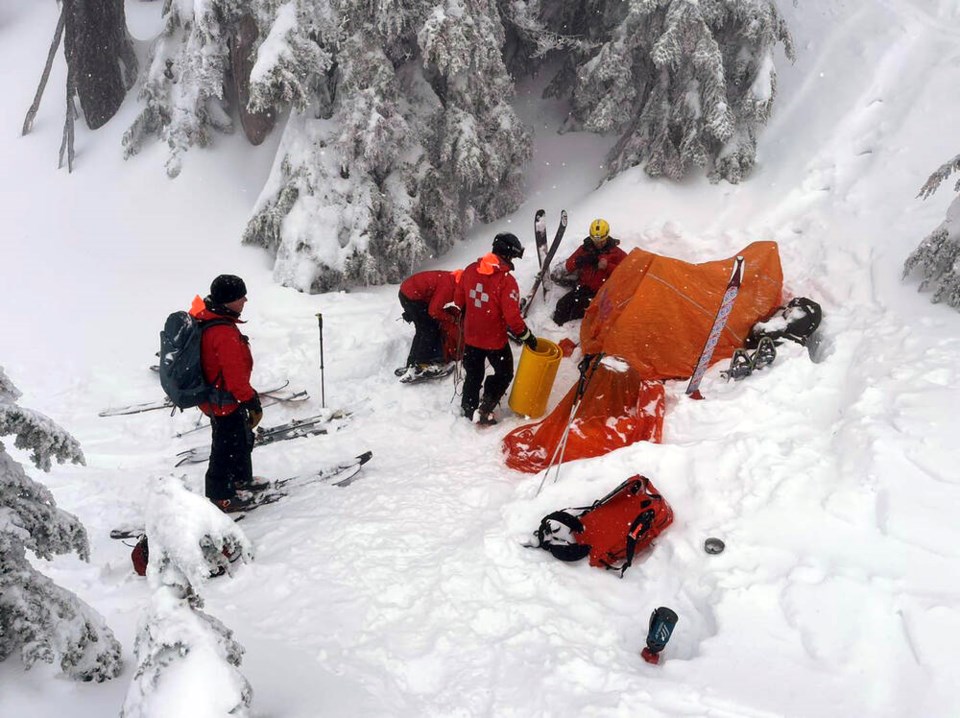North Shore Rescue says a woman is very fortunate to have survived being caught in an avalanche and buried for 20 to 30 minutes.
A Surrey couple in their 40s were coming down from Pump Peak on Mount Seymour just after 11 a.m. on Sunday when they triggered an avalanche, said search manager Dave Barnett.
“He was knocked over and when he turned around to see where his wife was, she was nowhere to be seen,” he said.
Distraught, the man called 911 and the RCMP patched him through to rescuers.
“We knew it was going to be 45 minutes before we were going to get there and time is really, really critical, so the best chance that she had was for him to locate her,” said Barnett.
The man searched the area and spotted the tip of a snowshoe sticking out of the slide site. He was able to dig her out.
She was breathing but only semi-responsive with severe hypothermia and showing signs of oxygen deprivation.
At this point, rescuers were well on their way, but Avalanche Canada’s forecast showed a high hazard level for the entire North Shore Mountains. There was some question as to whether it would be safe to send rescuers in, Barnett said, but the team’s avalanche technicians deemed the risk was acceptable for the terrain they were in.
“The whole area was showing signs of avalanche activity. Our teams were observing snow movement cracks and other signs of the instability of the snowpack. We knew it was a very serious situation,” he said. “Had they been in a different area, we easily may not have gone.”
Because it was a “code alpha” for an avalanche, Barnett sent the team’s advanced medical providers who covered the woman in warming vests and coats to bring her temperature back up. Without help, the couple wouldn’t have made it out on their own, he said.
Mt. Seymour’s ski patrol provided a stretcher to bring her back to the ski area where North Shore Rescue volunteers met them and gave her a ride back to the parking lot. An ambulance was waiting for them but, Barnett said, amazingly, she declined a ride to the hospital.
“With a little bit of warming and rest time, we would expect and hope that she fully recovers,” he said.
Barnett said the woman was extremely fortunate to not only have survived but to have walked away without serious injuries.
“It’s not uncommon for people to die of asphyxiation. Someone may live in a snowpack for possibly 20 minutes. If the effect of oxygen deprivation doesn’t kill them, in our North Shore mountains, they’re usually bashed and rattled around into trees and suffer major trauma. And some people will be so hypothermic, they would go into cardiac arrest,” he said. “We had an unbelievable outcome. Very few of them turn out that way.”
The incident underscores the importance of staying out of mountainous terrain when avalanche risks are high, Barnett said. With proper avalanche training, the couple likely would have avoided the area entirely. Barnett said they weren’t equipped to deal with a slide either.
Had they been wearing avalanche transceivers and carrying shovels and probes, it would have been much faster to find the woman and dig her out, Barnett said.
“People should stay out of mountainous terrain when the conditions are this high. Period,” he said. “When it is safe to go into the backcountry, people should monitor the avalanche bulletins and pick the appropriate terrain for the conditions and then of course be prepared with the training and the equipment and the know-how to use it.”
As of Monday, Avalanche Canada’s forecast shows “high” or “considerable” risk for the North Shore Mountains for the rest of the week.



